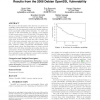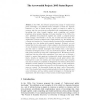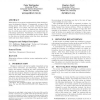173 search results - page 8 / 35 » Predicting the severity of a reported bug |
IMC
2009
ACM
14 years 2 months ago
2009
ACM
We report on the aftermath of the discovery of a severe vulnerability in the Debian Linux version of OpenSSL. Systems affected by the bug generated predictable random numbers, mo...
DIS
2005
Springer
14 years 1 months ago
2005
Springer
In the 1980s, Don Swanson proposed the concept of “undiscovered public knowledge,” and published several examples in which two disparate literatures (i.e., sets of articles hav...
TSE
2008
13 years 8 months ago
2008
This paper introduces a new technique for predicting latent software bugs, called change classification. Change classification uses a machine learning classifier to determine wheth...
CSMR
2007
IEEE
14 years 2 months ago
2007
IEEE
Despite the conventional wisdom concerning the risks related to the use of source code cloning as a software development strategy, several studies appeared in literature indicated...
MSR
2006
ACM
14 years 2 months ago
2006
ACM
Refactorings are program transformations which should preserve the program behavior. Consequently, we expect that during phases when there are mostly refactorings in the change hi...



